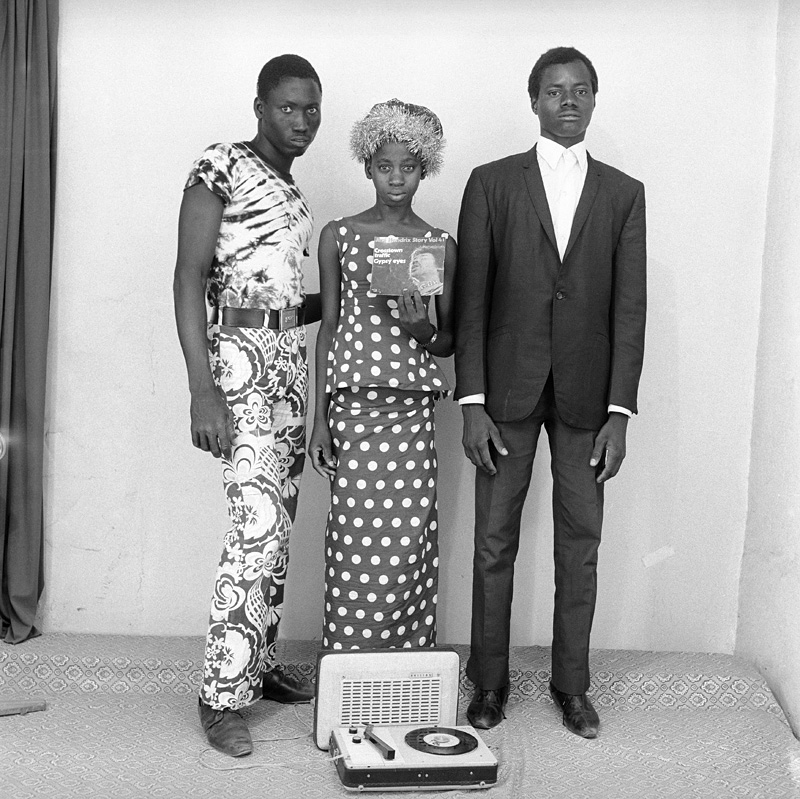WEDNESDAY 3/14
Photography: A New Continent
It takes courage to open a gallery these days, when so many have closed since the recession hit. Yet that’s just what Mariane Lenhardt has done downtown, and her first show justifies that confidence. A Parisian of African ancestry, she moved to Seattle last year because “my husband works for Boeing,” she explains. The focus of her M.I.A Gallery—not to be confused with the old Mia Gallery in Pioneer Square, which closed in ’97—will be contemporary and African art, making Malick Sidibé a perfect first show. Now in his late 70s, he apprenticed in a photo studio in Bamako, the capital of Mali, just as colonial rule was coming to an end. Once he could afford a camera, he went freelance, soon becoming Bamako’s top party and studio photographer of the ’60s and ’70s. It was a giddy, heady time—the French were leaving, rock and roll was being discovered on LPs and transistor radios, men and women were allowed to mingle at dances, where the girls wore miniskirts and the guys sharp suits and ties. Sure, there’s poverty and drought outside the frame of Sidibé’s bright-flash images, but these are celebratory shots of people who want to celebrate (or dance or show off their new motorcycles). Leave it to Western photojournalists to cover the famines and orphans. This is African photography for Africans—and it’s the best Seattle photo show I’ve seen in the past couple of seasons. There’s something proud and joyous about most of Sidibé’s subjects; their snazzy Western fashions help convey the optimism of the times: Black Power in the U.S., Miles Davis and Jimi Hendrix on the airwaves, and the old map of French Sudan being redrawn into Mali and Senegal. Their world was profoundly new, and Sidibé beautifully captures the promise of that era. (Ends March 24.) M.I.A Gallery, 1203 Second Ave., 467-4927, m-i-a-gallery.com. Free. 10:30 a.m.–5:30 p.m. BRIAN MILLER
THURSDAY 3/15
Books: Harmonic Convergence
I hate writers who miss deadlines. So, at page 204 (of 369) in Hari Kunzru‘s latest novel, I can offer only a partial endorsement of this California desert saga, which skips back and forth from 2009 to Spanish colonial days and many years in between. Gods Without Men (Knopf, $26.95) skillfully shifts among a large cast of players, who include a dissolute British rocker, a flying-saucer cult, the shape-shifting animals of Native American myth, Iraqi refugees, Brooklyn yuppies, and Mormon heretics. All are seekers of a sort, some certifiably nuts and possibly homicidal, others just desperate and scared. What they’re missing, in a sense, is the spark of the divine so absent from our secular world. They want answers, clarity, that the tangled material realm refuses to provide. Some of Kunzru’s characters look to the sky for salvation, for UFOs to come provide guidance; others turn to peyote or even computer algorithms. For instance, the Punjabi-American father of a missing autistic boy is a Wall Street quant whose mathematical models reveal “a strange harmony to the movements of this grab bag of statistics,” one that his boss (possibly another dangerous cult leader) tells him is “an attempt to stand outside time.” It’s the same impulse that draws so many pilgrims to the Mojave Desert, where they wait for the aliens. What the reader encounters, at least, is an intriguing series of coincidences as characters reappear and parallels recur over time. But if the novel falls apart in its last third, blame Kunzru, not me. Elliott Bay Book Co., 1521 10th Ave., 624-6600, elliottbaybook.com. Free. 7 p.m. BRIAN MILLER
Film: Family Trials
If you insist on seeing something grim and Holocausty, In Darkness is still playing at the Seven Gables. Otherwise, the 17th edition of the Seattle Jewish Film Festival begins on a more contemporary and familial note with The Flood, an affecting little coming-of-age movie about a scrawny boy anxiously studying for his bar mitzvah. Yoni, a little hustler, does other kids’ homework to buy protein powder; teenage muscles can’t come fast enough, especially when he’s being bullied at school. The Roshko family has more problems on top of Yoni’s: their older, autistic son has been sent home from an institution; father Gidi, an aviator, has been grounded for obscure reasons; and mother Miri’s day-care center begins to falter while she cares for Tomer, the movie’s Rain Man figure. “We are the village freak show,” Yoni despairs, but Guy Nattiv’s drama doesn’t present the Roshkos’ troubles with undue solemnity. These are ordinary folks struggling with everyday hardships that Seattle viewers may recognize from their own lives. Scenes between the two brothers, collecting bugs and visiting the beach, suggest a more benign Of Mice and Men. The film is followed by a gala after-party at the Palace Ballroom. Running through March 25 at venues including Pacific Place and SIFF Cinema at the Uptown, the fest includes over 20 more titles, music, and related cultural events. Cinerama, 2100 Fourth Ave., 324-9996, seattlejewishfilmfestival.org. $50–$75 (regular screenings $9–$15). 6:45 p.m. BRIAN MILLER
FRIDAY 3/16
Books: In the Zona
Possibly the longest movie review ever written, Geoff Dyer‘s Zona: A Book About a Film About a Journey to a Room (Pantheon, $24) immediately becomes essential reading for all you fans of the late Russian director Andrei Tarkovsky (1932–1986), who form an obsessive group. Dyer would know, being one of their tribe; he’s particularly obsessed with the 1979 Stalker, a very slow and gnomic three-hour art movie that he has seen dozens of times—but never on video! because that would be sacrilege!—and describes as “a literal journey that is also a journey into cinematic space and—in tandem—into time.” Part of the book’s charm is that it’s as much about the author as about the auteur. Dyer keeps injecting himself into the text with digressive Pale Fire–length footnotes (he hates Top Gear, loves Burning Man, doesn’t do as much acid as when he first bonded with Stalker, etc.), revealing most of his British quirks with a candor entirely absent in Stalker itself. However, let’s be frank: Many cinéastes find Tarkovsky a colossal bore and Stalker a hopeless pile of pretentious hokum—only profound to those who habitually go out looking for profundity (or are stoned). But even for nonbelievers, Zona is highly entertaining, because Dyer is such an erudite and lively writer. (On the rise of texting: “In evolutionary terms, the index finger enjoyed a long period of dominance in the era of the rotary phone, but this action is now close to extinct . . . while the thumb enjoys a renaissance in the age of texting and mobiles.”) He could just as easily write a book-length appreciation of, say, Project X. Which we would gladly also read. Seattle Central Library, 1000 Fourth Ave., 386-4636, spl.org. 7 p.m. BRIAN MILLER
Dance: Blissed Out
Dance audiences are like vampires—they demand fresh blood. New works are an exception to the repertory rule in classical music, but they’re a regular occurrence in the dance world. Pacific Northwest Ballet director Peter Boal is adding to the company collection with this year’s New Works program, featuring choreography that extends ballet past its classical roots into a trio of contemporary directions. Hip-hop artist Victor Quijada returns to PNB with Mating Theory, a new hybrid work incorporating capoeira, yoga, and martial arts. Annabelle Lopez Ochoa will expand her recent work Cylindrical Shadows, originally made for Olivier Wevers’ Whim W’Him company, which reflects her foundations in European contemporary dance. Lastly, British-trained David Dawson finds a glorious exuberance in that English technical specificity with A Million Kisses to My Skin, a work he intends to evoke “complete bliss.” (Through March 24.) McCaw Hall, 321 Mercer St. (Seattle Center), 441-2424, pnb.org. $28–$168. 7:30 p.m. SANDRA KURTZ
SATURDAY 3/17
Sports: So Many Questions
Of course Seattle Sounders fans get giddy at the start of every season, and proclaim “This is our year!” But there seems to be a more intense, even edgy, nervous energy about the start of this season. Partly that’s because of the roster turnover, more extensive than at the beginning of 2010 or 2011, with retirements and eyebrow-raising trades. But goalkeeper Michael Gspurning has so far given us no serious reason to worry about his ability to replace icon (not to say deity) Kasey Keller. A crowd of 23,000 got a small taste of new forward Eddie Johnson at the March 7 CONCACAF Champions League match, and seemed impressed; he’s going to get very little benefit of the doubt, though, considering his controversially uneven career, and that we gave up two fan favorites for him, and that we’ve been burned before by hyped would-be saviors. But as of this writing we’re undefeated in pre-MLS matches. Steve Zakuani‘s return, after a broken leg last April, is eagerly (not to say manically) anticipated. David Estrada, formerly David Who?, may be this season’s Mauro Rosales, the hero who snuck in and shocked everyone. On paper, we could—we really could—take it all. On the other hand, fans are still reeling from the poleax blow of 2011’s first playoff game, last October 29 at Real Salt Lake—a 3-0 loss, our Alamo, our Titanic, our Pearl Harbor. So many question marks, but so much proven excellence. How will it all shake out? The MLS season opens tonight, against Toronto. CenturyLink Field, 800 Occidental Ave. S., soundersfc.com. $28–$98. 7 p.m. GAVIN BORCHERT








